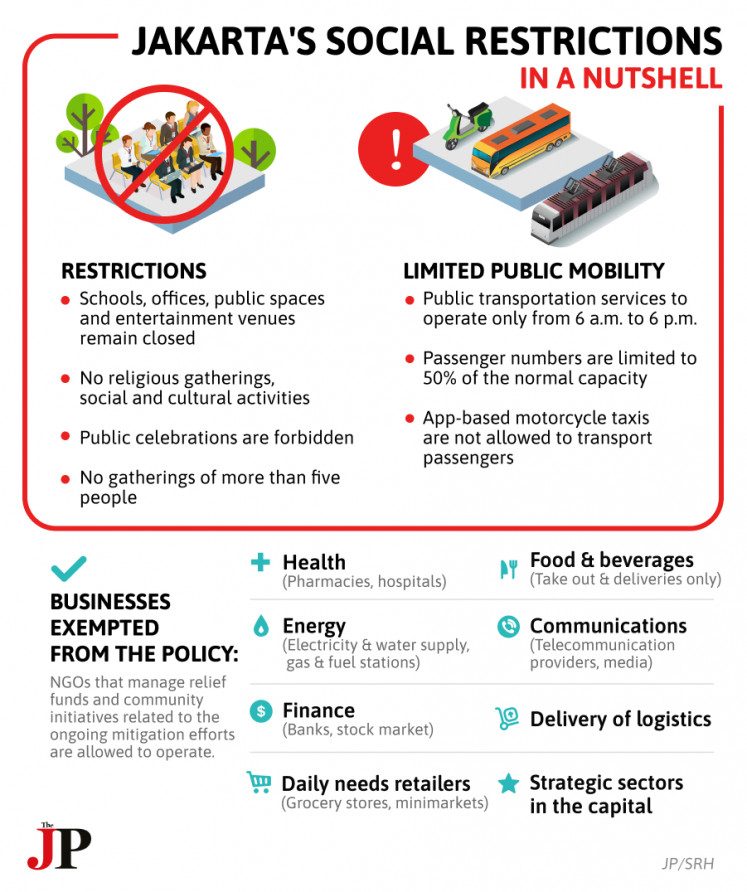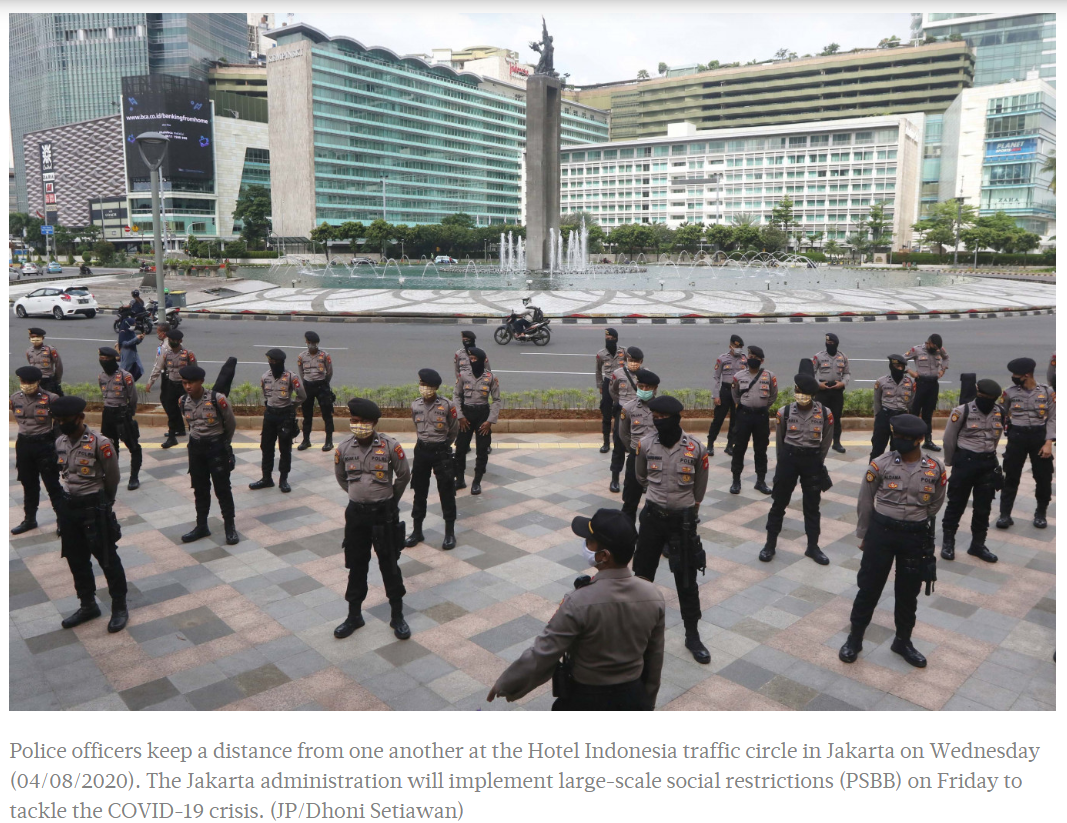Indonesia – ‘Break the chain!’: Businesses brace for Jakarta’s social restrictions
Essential-needs businesses have promised smooth services with retail stocks sufficient at least until May as Jakarta, Indonesia’s economic powerhouse, will enforce large-scale social restrictions starting Friday to slow down the spread of COVID-19.
The Jakarta Post spoke to businesspeople in sectors related to cash, fuel, food, medicine, retail, water, communications and logistics, which are exempted from the 14-day social restrictions.
The insiders said existing supplies were enough to support operations during the two-week period, but many are less certain about long-term supplies and business continuity in view of the broader effect of the pandemic. Meanwhile, businesses in other industries, such as construction, consulting and tourism, will have to close shop, along with schools and other public institutions, while transportation services will be limited.
For the 410-member Indonesian Food and Beverage Association (Gapmmi), the nationwide processed food supply was expected to last until June, including for Jakarta, chairman Adhi S. Lukman said. “Some fresh produce is becoming harder to come by, logistically. That’s why processed goods are hoped to ensure food supply,” he added.
Two-thirds of Gapmmi members expected a sales drop of between 20 percent and 40 percent over the coming two weeks due to declining demand from office workers, event organizers and store owners as Jakarta tightens restrictions, said Adhi.
Leaders of satellite cities in Greater Jakarta, which covers Jakarta, Bogor, Depok, Tangerang and Bekasi and is home to some 30 million people, have also agreed to impose large-scale social restrictions (PSBB) in their respective regions. Around half of Indonesia’s 2,956 COVID-19 confirmed infections and 240 deaths occurred in Jakarta, making it the nation’s virus epicenter.
 Jakarta’s social restrictions in a nutshell. (JP/SRH)
Jakarta’s social restrictions in a nutshell. (JP/SRH)
Economic scholars have found that cities that intervened earlier and more aggressively grow faster after the pandemic is over. A new study titled “Pandemics depress the economy, public health interventions do not: Evidence from the 1918 flu” found that, while pandemics depress economies, aggressive public health interventions could bounce back the economies faster.
“As long as all regions implementing PSBB can agree that logistics is a priority, particularly logistics related to food and medical supplies, then it shouldn’t be a problem,” said Devi Ariyani of think tank Indonesia Services Dialogue (ISD).
She added that internet and telecommunication services as the “backbone” of business operations amid physical distancing required particular attention from authorities.
The Indonesian Logistics Association (ALI) has reported that the logistics capacity in the country was still sufficient to serve goods distribution to meet current market supply and demand, especially since the general goods delivery volume in the country was declining.
“Until today, the logistics capacity [to distribute goods] is more than enough, because many industries are actually slowing down,” said ALI chairman Zaldy Ilham Masita. The distribution of staple food, pharmaceutical products and medical equipment had been on the rise, while many deliveries for nonessentials, such as electronics, gadgets and clothes, had declined.
Representatives from the Indonesian Pharmaceutical Association (GP Farmasi) and Indonesian Retailers Association (Aprindo) said the stocks of slow-moving medical goods and staple food were enough until June, which would include the Idul Fitri holiday in late May.
Both also said that supplies of fast-moving medical goods, including hand sanitizer and face masks, were running thin this month. Food and medical producers have been looking to import goods from Asian countries other than China to meet demand.
On the utilities side, a representative from Indonesia’s largest fuel and gas distributor, state-owned Pertamina, said fuel and cooking gas supplies for Jakarta were safe at “almost 21 days” worth of supply. The company’s safe supply benchmark is 21 days.
“More so for fuel, as daily consumption has fallen in Jakarta. Meanwhile, subsidized liquefied petroleum gas consumption had experienced a significant rise in Greater Jakarta at 13 percent,” said Pertamina’s regional corporate communications manager Dewi Sri Utami.
City-owned water company PT PAM Jaya, which also oversees the private water companies PT PAM Lyonnaise Jakarta (Palyja) and PT Aetra Air Jakarta (Aetra), said piped water supply was at a normal level of 20,200 liters per second.
“We distribute around 630 million cubic meters of water per year. This is still on track at the moment,” said PAM Jaya president director Priyatno Bambang Hernowo. PAM Jaya recently deployed mobile water tanks to neighborhoods without running water, as only 62 percent of citizens have access to tap water.
Meanwhile, Bank Indonesia is coordinating with local banks to ensure cash availability at banks and ATMs around Jakarta. The central bank recorded Rp 19.3 trillion in cash outflow for Greater Jakarta in April. For comparison, the total currency in circulation is Rp 738 trillion.
“Under such conditions and given the upcoming Jakarta PSBB, Bank Indonesia has front-loaded cash supplies to several regions and some banks that had front-loaded withdrawals,” said BI spokesman Onny Widjanarko.
Representing many companies forced to close shop temporarily, Indonesian Travel Agents Association (Astindo) secretary-general Pauline Suharno said Jakarta’s restrictions would be another blow to the tourism industry, which was already the hardest hit from the pandemic.
Pauline went on to say that members’ sales and orders had dropped 94 percent between February and March, forcing them to furlough employees for two weeks. “We told association members that, with our two weeks’ sacrifice, hopefully, things will get better soon. Break the chain!” she said.
Source: https://www.thejakartapost.com/news/2020/04/09/break-the-chain-businesses-brace-for-jakartas-social-restrictions.html


 Thailand
Thailand




